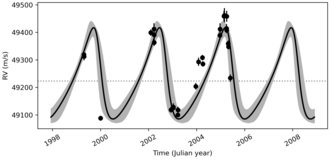HD 81040 b
 Radial velocity curve of HD 81040 b[1] | |
| Discovery | |
|---|---|
| Discovered by | Sozzetti et al.[2] |
| Discovery site | Observatoire de Haute-Provence in France |
| Discovery date | November 24, 2005 |
| Doppler Spectroscopy | |
| Orbital characteristics | |
| 1.946 ± 0.014 AU (291,100,000 ± 2,100,000 km)[3] | |
| Eccentricity | 0.525+0.024 −0.026[3] |
| 1,004.7 ± 3.0 days (2.7507 ± 0.0082 years)[4] | |
| Inclination | 111.4°+4.4° −4.7°[4] |
| 19.2°+5.0° −4.8°[4] | |
| 245511.1+10 −8.7[3] | |
| 73.1°±4.3°[4] | |
| Semi-amplitude | 168 ± 9[2] |
| Star | HD 81040 |
| Physical characteristics | |
| Mass | 7.53±0.032 MJ[4] |
HD 81040 b is a massive gas giant exoplanet that orbits the star HD 81040, discovered in 2005 by radial velocity.[2] Its orbital period is just over 1000 days. It has a semimajor axis of about 1.95 AU, and its orbit is quite eccentric, at a little over 0.5.[3][4]
Astrometry of HD 81040 using Gaia, published in several papers, has determined an orbital inclination of about 111°. This, combined with the minimum mass, gives a true mass of 7.53 MJ.[3][1][5][6][4] Since the inclination is high, there is a small chance that the planet transits.[3]

See also
References
- ^ a b c "Image of the Week: Astrometric Orbit of the Exoplanet-Host Star HD81040". cosmos.esa.int. ESA/Gaia/DPAC/CU4-CU3. 31 January 2022. Retrieved 14 September 2022.
- ^ a b c Sozzetti, A.; et al. (2006). "A massive planet to the young disc star HD 81040". Astronomy and Astrophysics. 449 (1): 417–424. arXiv:astro-ph/0511679. Bibcode:2006A&A...449..417S. doi:10.1051/0004-6361:20054303. S2CID 7647622.
- ^ a b c d e f Li, Yiting; Brandt, Timothy D.; Brandt, G. Mirek; Dupuy, Trent J.; Michalik, Daniel; Jensen-Clem, Rebecca; Zeng, Yunlin; Faherty, Jacqueline; Mitra, Elena L. (2021). "Precise Masses and Orbits for Nine Radial-velocity Exoplanets". The Astronomical Journal. 162 (6): 266. arXiv:2109.10422. Bibcode:2021AJ....162..266L. doi:10.3847/1538-3881/ac27ab. S2CID 237592581.
- ^ a b c d e f g Winn, Joshua N. (September 2022). "Joint Constraints on Exoplanetary Orbits from Gaia DR3 and Doppler Data". The Astronomical Journal. 164 (5): 196. arXiv:2209.05516. Bibcode:2022AJ....164..196W. doi:10.3847/1538-3881/ac9126. S2CID 252211643.
- ^ Gaia Collaboration; et al. (2023). "Gaia Data Release 3". Astronomy & Astrophysics. 674: A34. arXiv:2206.05595. doi:10.1051/0004-6361/202243782. S2CID 249626026.
- ^ Feng, Fabo; Butler, R. Paul; et al. (August 2022). "3D Selection of 167 Substellar Companions to Nearby Stars". The Astrophysical Journal Supplement Series. 262 (21): 21. arXiv:2208.12720. Bibcode:2022ApJS..262...21F. doi:10.3847/1538-4365/ac7e57. S2CID 251864022.
